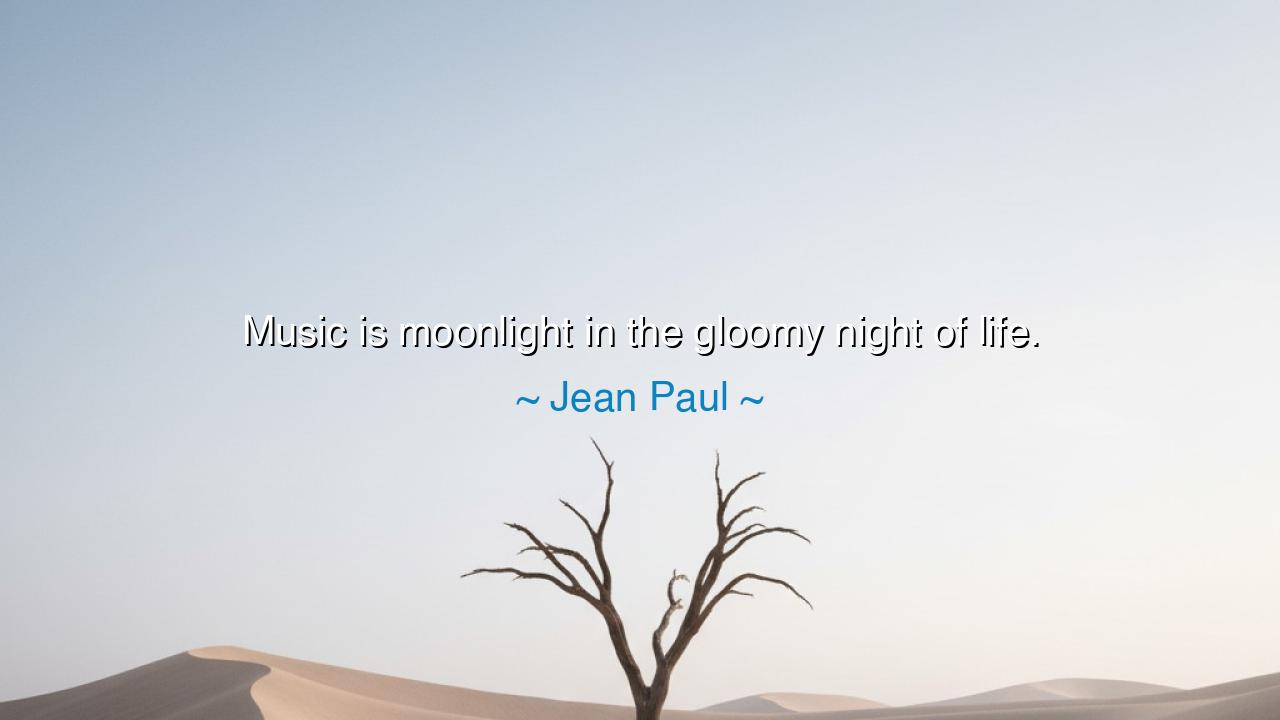
Music is moonlight in the gloomy night of life.






Music, that divine force that transcends the mundane world, is not merely sound, but a profound expression of the soul. Jean Paul, the great German writer and philosopher, beautifully captured this essence when he said, "Music is moonlight in the gloomy night of life." How apt is this imagery! In the darkest of times, when life appears shadowed by sorrow, struggle, or despair, music emerges as a beacon, like the soft glow of the moon in a starless sky, guiding us with its gentle light. It illuminates the path through suffering and sadness, offering solace and strength where there seems to be none.
The origin of this metaphor lies in the deep wisdom of the ancients, who understood that music is not simply a collection of notes, but a universal language that speaks directly to the heart. The Greeks, for instance, recognized the profound power of music in healing. Pythagoras, the great philosopher, believed that music had the power to restore harmony within the body and the mind, aligning the soul with the divine. For him, the perfect intervals and melodies were not merely artistic expressions, but sacred tools that brought balance to the chaos of the human condition. In this sense, music was not a luxury, but a necessity — the very moonlight in the long, dark night of the human experience.
Consider the great composer Ludwig van Beethoven, who, though deaf, continued to create some of the most profound symphonies the world has ever known. In the midst of personal hardship, loneliness, and the loss of his hearing, Beethoven’s music became a testament to the enduring power of the spirit. It was his moonlight, shining brightly in the midst of his personal night. Beethoven’s works like the Ninth Symphony and Moonlight Sonata continue to remind us that even in the darkest of times, music can be a source of great strength and illumination. His resilience speaks to the transformative power of music, as it uplifts the soul and helps the weary navigate their struggles.
This idea of music as a form of light, guiding us through our difficulties, can be found throughout history. King David, a man known for both his victories and his despair, sought comfort and solace through music. The Psalms, many of which were sung by David, are a reflection of the emotional highs and lows he faced. These songs of praise and lament are both moonlight and the night, capturing the full spectrum of human experience. They serve as a reminder that in the darkest moments of our lives, it is not the absence of suffering that defines us, but the presence of something greater — be it faith, hope, or music — that can guide us through.
To understand this quote fully, we must recognize that life is filled with gloomy nights. These are moments of loss, pain, and confusion. Yet, it is in these very moments that the importance of music shines brightest. When we feel lost, it is the melody that calls us back to ourselves. When we feel alone, the harmony of a song reminds us of the collective human experience. It is the soft, comforting light of music that can pierce the deepest darkness and bring us back into balance. We need not wait for external circumstances to change — the music within us is always there, ready to guide us through.
Thus, the lesson that Jean Paul imparts is a timeless one: music is not merely a form of entertainment or distraction; it is a source of light and healing. When life feels heavy, when the road ahead is obscured, turn to the moonlight of music. Let it wash over you, as it did for Beethoven, David, and countless others, and remind you that even in darkness, there is beauty, there is hope, and there is a path forward. Allow yourself to be transformed by the rhythm of existence itself.
Let us take action: when sorrow grips your heart, seek out music. It does not matter if it is a symphony or a simple song — the key is to embrace its power. Allow it to guide you, to uplift you, and to remind you that even in the darkest of nights, there is always moonlight. The moon does not shy away from the night; rather, it reveals its beauty in the darkness. So too can we find strength and grace in the midst of our struggles, if we allow the music to lead us. Let the melody be your guide, and find your way through the gloomy night of life.






AAdministratorAdministrator
Welcome, honored guests. Please leave a comment, we will respond soon